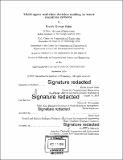Multi-agent real-time decision making in water resources systems
Author(s)
Sahu, Reetik Kumar
DownloadFull printable version (12.78Mb)
Other Contributors
Massachusetts Institute of Technology. Department of Civil and Environmental Engineering.
Advisor
Dennis B. McLaughlin.
Terms of use
Metadata
Show full item recordAbstract
Optimal utilization of natural resources such as water, wind and land over extended periods of time requires a carefully designed framework coupling decision making and a mathematical abstraction of the physical system. On one hand, the choice of the decision-strategy can set limits/bounds on the maximum benefit that can be extracted from the physical system. On the other hand the mathematical formulation of the physical system determines the limitations of such strategies when applied to real physical systems. The nuances of decision making and abstraction of the physical system are illustrated with two classical water resource problems: optimal hydropower reservoir operation and competition for a common pool groundwater source. Reservoir operation is modeled as a single agent stochastic optimal control problem where the operator (agent) negotiates a firm power contract before operations begin and adjusts the reservoir release during operations. A probabilistic analysis shows that predictive decision strategies such as stochastic dynamic programming and model predictive control give better performance than standard deterministic operating rules. Groundwater competition is modeled as a multi-agent dynamic game where each farmer (agent) aims to maximize his/her personal benefit. The game analysis shows that uncooperative competition for the resource reduces economic efficiency somewhat with respect to the cooperative socially optimum behavior. However, the efficiency reduction is relatively small compared to what might be expected from incorrect assumptions about uncertain factors such as future energy and crop prices. Spatially lumped and distributed models of the groundwater system give similar pictures of the inefficiencies that result from uncooperative behavior. The spatially distributed model also reveals the important roles of the geometry and density of the pumping well network. Overall, the game analysis provides useful insight about the factors that make cooperative groundwater management beneficial in particular situations.
Description
Thesis: Ph. D. in Computational Science and Engineering, Massachusetts Institute of Technology, Department of Civil and Environmental Engineering, 2018. Cataloged from PDF version of thesis. Includes bibliographical references (pages 77-83).
Date issued
2018Department
Massachusetts Institute of Technology. Department of Civil and Environmental EngineeringPublisher
Massachusetts Institute of Technology
Keywords
Civil and Environmental Engineering.